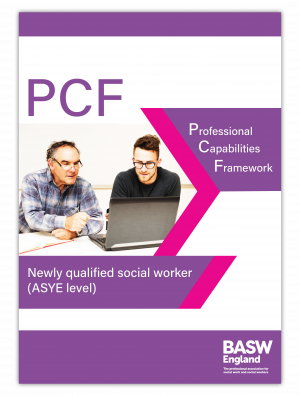1. PROFESSIONALISM
Identify and behave as a professional social worker, committed to professional development
Social workers are members of an internationally recognised profession. Our title is protected in UK law. We demonstrate professional commitment by taking responsibility for our conduct, practice, self-care and development. We seek and use supervision and other professional support. We promote excellent practice and challenge circumstances that compromise this. As representatives of the profession, we safeguard its reputation. We are accountable to people using services, the public, employers and the regulator. We take ethical decisions in the context of multiple accountabilities.
I…
- am able to meet the requirements of the professional regulator
- am able to explain the role of the social worker in a range of contexts and uphold the reputation of the profession
- understand that social work is an international profession with a global definition that supports professional identity and practice with diverse communities in England
- make proactive use of supervision to reflect critically on practice, explore different approaches to my work, support my development across the nine capabilities and understand the boundaries of professional accountability
- demonstrate professionalism in terms of presentation, demeanour, reliability, honesty and respectfulness
- demonstrate workload management skills and develop the ability to prioritise
- recognise and balance my own personal/professional boundaries in response to changing and complex contexts
- demonstrate effective use of self in practice
- recognise my own professional strengths and limitations, and how to seek advice
- identify my learning needs; assume responsibility for improving my practice through appropriate professional development
- develop ways to promote wellbeing at work, identifying strategies to protect and promote my own wellbeing and self-care, and the wellbeing of others
- identify and implement strategies for responding appropriately to concerns about practice or procedures, seeking guidance if required.
2. VALUES AND ETHICS
Apply social work ethical principles and value to guide professional practices
Social workers have an obligation to conduct themselves and make decisions in accordance with our Code of Ethics. This includes working in partnership with people who use our services. We promote human rights and social justice. We develop and maintain our understanding of the value base of our profession throughout our career, its ethical standards and relevant law.
I…
- understand and apply the profession’s ethical principles (Code of Ethics) and legislation, taking account of these in reaching decisions
- recognise and manage the impact of my own values on professional practice
- recognise and manage conflicting values and ethical dilemmas to arrive at principled decisions
- demonstrate respectful partnership work with service users and carers, eliciting and respecting their needs and views, and promoting their participation in decision-making wherever possible
- recognise and promote individuals’ rights to autonomy and self-determination
- promote and protect the confidentiality and privacy of individuals within and outside their families and networks, recognising the requirements of professional accountability and information sharing
- am able to communicate confidentiality and privacy in decisions effectively and compassionately.
3. DIVERSITY AND EQUALITY
Recognise diversity and apply anti-discriminatory and anti-oppressive principles in practice
Social workers understand that diversity characterises and shapes human experience and is critical to the formation of identity. Diversity is multi-dimensional and includes race, disability, class, economic status, age, sexuality, gender (including transgender), faith and belief, and the intersection of these and other characteristics. We understand that because of difference, and perception of difference, a person's life experience may include oppression, marginalisation and alienation as well as privilege, power and acclaim. We identify this and promote equality.
I…
- identify and take account of the significance of diversity, discrimination and inequality on the lives of people, and show application of this understanding in my practice
- recognise oppression and discrimination by individuals or organisations and implement appropriate strategies to challenge, in partnership and with the involvement of people affected where possible
- identify and understand the impact of the power invested in my role on relationships and interventions and am able to adapt my practice accordingly, striving to reduce the risk of power misuse.
4. RIGHTS, JUSTICE AND ECONOMIC WELLBEING
Advance human rights and promote social justice and economic wellbeing
Social workers recognise and promote the fundamental principles of human rights, social justice and economic wellbeing enshrined in national and international laws, conventions and policies. These principles underpin our practice and we use statutory and case law effectively in our work. We understand and address the effects of oppression, discrimination and poverty. Wherever possible, we work in partnership with people using services, their carers and families, to challenge inequality and injustice, and promote strengths, agency, hope and self-determination.
I…
- begin to integrate principles of and entitlements to social justice, social inclusion and equality in my analysis and practice, by identifying factors that contribute to inequality and exclusion, and supporting people to pursue options to enhance their wellbeing and challenge injustice
- address oppression and discrimination applying the law to protect and advance people's rights, recognising how legislation can constrain or advance these rights
- apply in practice principles of human, civil rights and equalities legislation, and manage competing rights, differing needs and perspectives
- recognise the impact of poverty and social exclusion and promote enhanced economic status through access to education, work, housing, health services and welfare benefit
- empower service users through recognising their rights and enable access where appropriate to independent advocacy
- demonstrate skills and approaches to practice that promote strengths, agency, hope and self-determination in people using services, carers, families and communities.
5. KNOWLEDGE
Develop and apply relevant knowledge from social work practice and research, social sciences, law, other professional and relevant fields, and from the experience of people who use services
We develop our professional knowledge throughout our careers and sustain our curiosity. As a unified profession, we develop core knowledge that relates to our purpose, values and ethics. We also develop specific knowledge needed for fields of practice and roles. Our knowledge comes from social work practice, theory, law, research, expertise by experience, and from other relevant fields and disciplines. All social workers contribute to creating as well as using professional knowledge. We understand our distinctive knowledge complements that of other disciplines to provide effective services.
I…
- consolidate, develop and demonstrate comprehensive understanding and application of the knowledge gained in my initial training, and knowledge related to my specialist area of practice, including critical awareness of current issues and new evidence-informed practice research
- demonstrate knowledge and application of appropriate legal and policy frameworks and guidance that inform and mandate social work practice. This may include Knowledge and Skills statements in adults or children’s social work
- apply legal reasoning, using professional legal expertise and advice appropriately
- recognise where scope for professional judgement exists and the importance of this to ensure ethical practice
- demonstrate and apply to practice a working knowledge of human growth and development throughout the life course
- recognise the short and long term impact of psychological, socio-economic, environmental and physiological factors on people’s lives, taking into account age and development, and how this informs practice
- understand the value of systemic approaches and how they can be used to understand and work with the person or family in their environment, social context and relationships, and inform social work practice
- acknowledge the centrality of relationships for people and the key concepts of attachment, separation, loss, change and resilience
- understand forms of harm and their impact on people, and the implications for practice, drawing on concepts of strength, resilience, vulnerability, risk and resistance, and apply to practice
- demonstrate a critical knowledge of the range of theories and models for social work intervention with individuals, families, groups and communities, and the methods derived from them
- demonstrate a critical understanding of social welfare policy, its evolution, implementation and impact on people, social work, other professions, and inter- agency working
- recognise the contribution, and begin to make use, of research to inform practice
- demonstrate a critical understanding of research methods
- value and take account of the expertise of service users, carers and professionals
- apply knowledge and understanding of the opportunities and risks of new technologies, digital resources, online communications, virtual environments and social media in social work.
6. CRITICAL REFLECTION AND ANALYSIS
Apply critical reflection and analysis to inform and provide a rationale for professional decision-making
Social workers critically reflect on their practice, use analysis, apply professional judgement and reasoned discernment. We identify, evaluate and integrate multiple sources of knowledge and evidence. We continuously evaluate our impact and benefit to service users. We use supervision and other support to reflect on our work and sustain our practice and wellbeing. We apply our critical reflective skills to the context and conditions under which we practise. Our reflection enables us to challenge ourselves and others, and maintain our professional curiosity, creativity and self-awareness.
I…
- apply imagination, creativity and curiosity to practice, considering a range of options to solve dilemmas and problems
- use reflective practice techniques to evaluate and critically analyse information, gained from a variety of sources, to construct and test hypotheses and make explicit evidence-informed decisions.
7. SKILLS AND INTERVENTIONS
Use judgement, knowledge and authority to intervene with individuals, families and communities to promote independence, provide support, prevent harm and enable
Social workers engage with individuals, families, and communities, working alongside people to determine their needs and wishes, and what action may be helpful. We build productive working relationships and communicate effectively. Using our professional judgement, we employ appropriate interventions, promoting self-determination, support, protection and positive change. We develop and maintain skills relevant to our roles. We understand and take account of power differentials and use our authority appropriately. We evaluate our own practice and its impact, and how we improve outcomes for those we work with.
I…
- use a range of methods to engage and communicate effectively with service users, eliciting the needs, wishes and feelings of all those involved, taking account of situations where these are not explicitly expressed
- demonstrate clear communication of evidence-informed professional reasoning, judgements and decisions, to professional and non-professional audiences/stakeholders
- build and use effective relationships with a wide range of people, networks, communities and professionals to improve outcomes, showing an ability to understand and work effectively with negative responses
- use appropriate assessment frameworks, applying information gathering skills to make and contribute to assessments, whilst continuing to build relationships and offer support
- select, use and review appropriate and timely social work interventions, informed by evidence of their effectiveness, that are best suited to the service user(s), family, carer, setting and self
- use a planned and structured approach informed by social work methods, models and tools to promote positive change, independence and to prevent harm
- recognise how the development of community resources, groups and networks enhance outcomes for individuals and the role of social work in promoting this
- record information in a timely, respectful and accurate manner. Write records and reports, for a variety of purposes with language suited to purpose and audience, using plain English and optimising use of information management systems. Distinguish fact from opinion and record conflicting views and perspectives.
- share information consistently in ways that meet legal, ethical and agency requirements
- recognise complexity, multiple factors, changing circumstances and uncertainty in people’s lives and am able to prioritise my intervention
- use authority appropriately in my role
- demonstrate understanding of and appropriate response to risk factors in my practice. Contribute to the assessment and management of risk, including strategies for reducing risk, distinguishing levels of risk for different situations and the value of positive risk taking when this supports self-determination and autonomy
- demonstrate application of principles and practice for safeguarding adults and children including consideration of potential abuse. Apply strategies that aim to reduce and prevent harm and abuse.
8. CONTEXTS AND ORGANISATIONS
Engage with, inform, and adapt to changing organisational contexts and the social and policy environments that shape practice. Operate effectively within and contribute to the development of organisations and services, including multi-agency and inter-professional settings
Social workers are informed about and proactively respond to the challenges and opportunities that come from changing social, policy and work contexts. We fulfil this responsibility in accordance with our professional values and ethics, as individual and collective professionals and as members of the organisations in which we work. We collaborate, inform and are informed by our work with other social workers, other professions, individuals and communities.
I…
- take account of legal, operational and policy contexts, proactively engage with my own organisation and contribute to its evaluation and development
- proactively engage with colleagues, and a range of organisations to identify, assess, plan and support the needs of service users and communities
- understand legal obligations, structures and behaviours within organisations and how these impact on policy, procedure and practice
- am able to work within an organisational remit and contribute to its evaluation and development
- understand and respect the role of others within the organisation and in the wider professional and service system of which it is a part, and work effectively with them
- work effectively as a member of a team, demonstrating the ability to develop and maintain appropriate professional and inter-professional relationships, managing challenge and conflict with support.
9. PROFESSIONAL LEADERSHIP
Promote the profession and good social work practice. Take responsibility for the professional learning and development of others. Develop personal influence and be part of the collective leadership and impact of the profession
We develop and show our leadership, individually and collectively, through promoting social work’s purpose, practices and impact. We achieve this through diverse activities, which may include: advancing practice, supervising, educating others, research, evaluation, using innovation and creativity, writing, using social media positively, being active in professional networks and bodies, contributing to policy and taking formal leadership/management roles. We promote organisational contexts conducive to good practice and learning. We work in partnership with people who use services and stakeholders in developing our leadership and aims for the profession.
I…
- show capacity for leading practice through the way I conduct my professional role, my contribution to supervision and to team and other professional meetings, promoting our purpose, practice and impact
- take steps to enable the learning and development of others
- contribute to collective/collaborative professional leadership through participating in peer support, social work forums and meetings within and/or outside my organisation
- understand my responsibility to seek, plan and undertake ongoing professional development.
Newly qualified social worker (ASYE level) resource downloads
Download PCF resources for the Newly qualified social worker (ASYE level) in full as a PDF
Newly qualified social worker (ASYE level) resource downloads
Download PCF resources for the Newly qualified social worker (ASYE level) in full as a word document.
Newly qualified social worker (ASYE level) is the fifth of nine level descriptors.
See more via the BASW 2018 PCF fan.
The Professional Capabilities Framework (PCF) is the profession-owned backbone of social work education and professional development in England.




